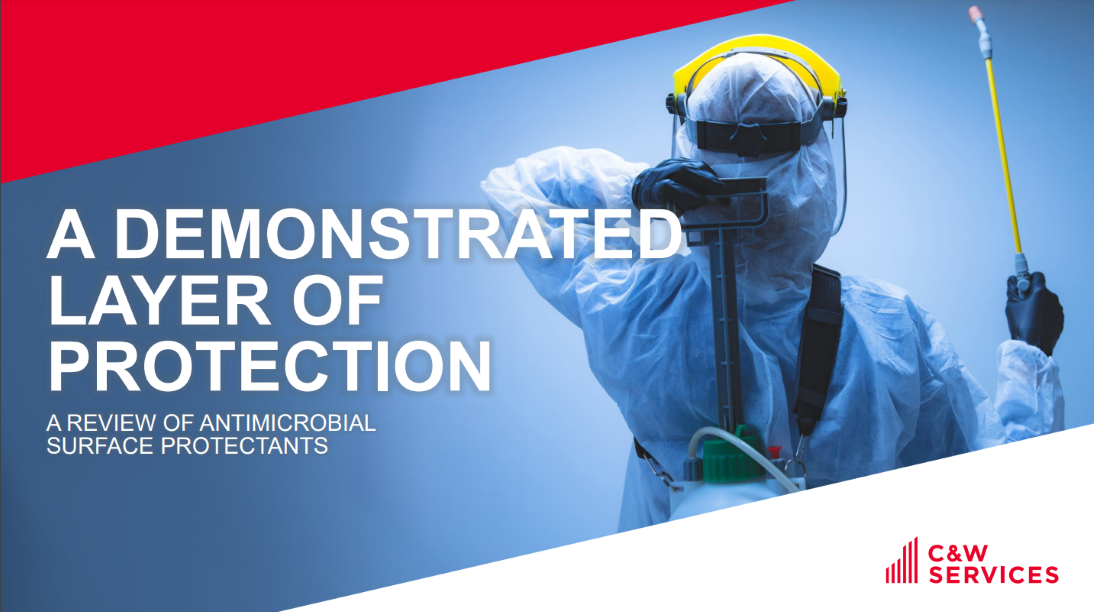COVID-19 and Beyond: Antimicrobial Surface Protectants
The COVID-19 pandemic is just the most recent world event bringing to light the importance of cleaning, sanitation and hygiene to business continuity and employee health and wellbeing. For the better part of three decades, antimicrobial surface protectants (ASPs) have shown to be effective against a variety of bacterial and viral threats. Even as knowledge about COVID-19 evolves to focus on airborne aerosol transmission, ASPs remain an important part of cleaning protocols now and in the future.
C&W Services’ review of ASPs is focused on better understanding the variety of products in the marketplace available to mitigate infection risk. Integrating ASPs into your cleaning protocols ensures the cleaning efforts you’re investing in are as effective as possible, and even an incremental increase in safety is an important and worthy investment.
ASPs were originally developed to reduce the number of hospital-acquired infections (HAIs) plaguing the healthcare industry. In medical settings and beyond, they have shown to be very effective against pneumonia, MRSA and c.difficile (c.diff), all of which pose dangers beyond to the workplace and workers.
For example, MRSA’s ease of surface to human cross-contamination has been known to severely effect workers in hot/humid, poorly maintained manufacturing space, refineries and ‘dirty’ industrial spaces. A MRSA outbreak in a facility can bring production to a halt, the same way COVID-19 brought the global economy to its slowest growth period in decades.
HOW ASPs CAN HELP
COVID-19 prevention measures such as widespread mask wearing, hand hygiene and social distancing efforts have helped suppress other common respiratory and gastrointestinal viruses over the past year. However, experts say they could make a vigorous comeback when coronavirus cases eventually decline. Viruses and bacteria such as norovirus are harder to combat on surfaces, but ASPs work well against surface borne threats. Taking a proactive approach with proper cleaning protocols with Level I and Level II cleaning plus the addition of the proper ASP can go a long way in reducing surface to human cross-contamination
-
Dispersion of cleaners and disinfectants are not always reliable even with an electrostatic sprayer. ASPs provide an extra layer of protection against unforeseen human error when cleaning and disinfecting.
-
Proper placement of polymer-based ASP films can help reduce potential bacterial cross-contamination from doorknobs, to shared tools, push-plates, elevator buttons, and handrails.
-
Some ASPs have hydrophobic properties, i.e. they repel water/moisture. These hydrophobic ASPs have been used on buildings as a coating to reduce mildew and algae buildup. Algae on an untreated surface will retain moisture that leaches into walls and can cause heat loss. ASP use can create a radiative response difference and therefore an ‘energy gain’, reducing energy costs.
-
Paints from our efficacy study have been shown to retain their antimicrobial properties for up to a decade. These paints are an excellent choice to reduce mildew growth in high moisture areas such as gyms, locker rooms, shower rooms and restrooms.
WHO IS USING ASPS?
-
A leading global computer software producer is actively treating more than 125 of its facilities with ASPs as they plan for the eventual return of 50,000 personnel
-
A major aircraft manufacturer is actively treating their corporate headquarters, manufacturing facilities and planes rolling off the assembly lines as part of their expanded ‘return to work’ plan
-
Most sports teams, both collegiate and professional, are using ASPs in their team locker rooms as a precautionary measure. Beyond COVID, historically, locker rooms have been a breeding ground for staph infections. ASPs will prove to be beneficial in keeping athletes healthy



